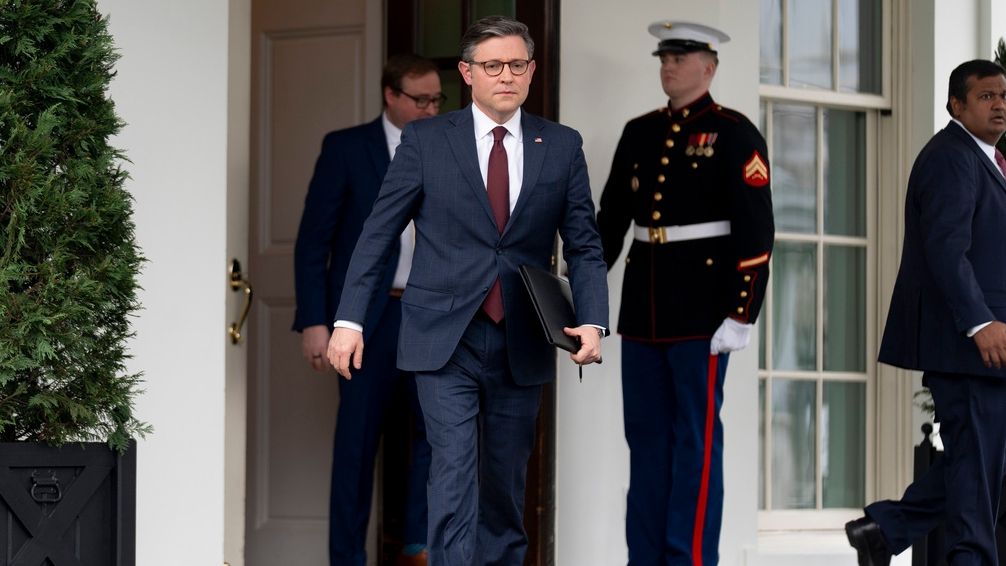Speaker of the House Mike Johnson, R-La., said he would work with Democrats to pass aid for Ukraine’s war effort. The announcement, in an interview with Politico, came after months of delay and on the same day Senate Minority Leader Mitch McConnell, R-Ky., called on members of his own party in the House to act.
Aid to Israel may be split into a separate bill, he said in the interview.
What You Need To Know
- Speaker of the House Mike Johnson, R-La., said he would work with Democrats to pass aid for Ukraine’s war effort
- The announcement, in an interview with Politico, came after months of delay and on the same day Senate Minority Leader Mitch McConnell, R-Ky., called on members of his own party in the House to act
- Johnson pointed to a pathway that suspends the rules of the House and requires two-thirds majorities
- That means Johnson, who can typically afford to lose only two Republican votes with his slim majority, will need a large swath of Democrats to back the bill
“I think it is a stand-alone, and I suspect it will need to be on suspension,” Johnson said, pointing to a pathway to passing legislation that suspends the rules of the House and requires two-thirds majorities.
That means Johnson, who can typically afford to lose only two Republican votes with his slim majority, will need a large swath of Democrats to back the bill. Democrats largely are unified on sending more aid to Ukraine, whose leaders and European allies have pleaded for more weapons and ammunition to fight Russian invaders since last year. Republicans have far more dissenters when it comes to the question of continuing to support Ukraine.
He also told reporters at a House GOP retreat in West Virginia Thursday he would only address foreign aid once the House settles government funding — a stance that could delay any action well into April as lawmakers ready to take a two-week break at the end of March.
The Senate already passed a $95.3 billion foreign aid package last month with a large bipartisan majority and McConnell called on his colleagues in the House to follow suit on Thursday.
“Finish the job,” McConnell said in a floor speech, arguing that providing equipment to Ukraine for battlefield success is not only “the surest way” to resolve the war, but it strengthens America’s interests. “Investing in our own military and our own defense industrial capacity at the same time is common sense,”
Johnson is facing heavy political pressure on all sides. Democrats have launched an effort to force the aid package to the House floor. Hardline conservatives have vowed to forcefully oppose any aid for Kyiv. And centrist Republicans are becoming restive as they await action.
Bucking Johnson, eight Republicans have already signed onto a “discharge petition” — a procedural tool that can circumvent the speaker’s control over which bills come up for a vote. But the effort would need far more support — from at least 218 members — to be successful.
Meanwhile, Ukrainian soldiers are suffering from shortfalls of ammunition. The Pentagon announced this week it will send about $300 million in weapons to Kyiv after finding some cost savings in its contracts. But the U.S. military remains deeply overdrawn and needs at least $10 billion to replenish all the weapons it has pulled from its stocks to fuel the desperate fight against Russia's invasion.
“It's dire so we need to pass it soon,” said Rep. Michael McCaul, the Republican chair of the House Foreign Affairs Committee.
McCaul is working with a group of senior Republicans on potentially adding provisions that would turn funding for Ukraine's government into loans, as well as legislation that would allow the U.S. to tap frozen Russian central bank assets to compensate Ukraine for damages from the invasion. The idea has been circulating for weeks among Ukraine supporters in the House, though there has been little sign of progress.
Working with Democrats is what ultimately doomed Johnson’s predecessor, former Speaker Kevin McCarthy, R-Calif., but Johnson does not currently appear at risk of suffering the same fate.
Many Republicans also want to include border policy with the funding — a demand that ties it to one of the most fraught issues in American politics, and one that has held up the assistance since fall of last year.



